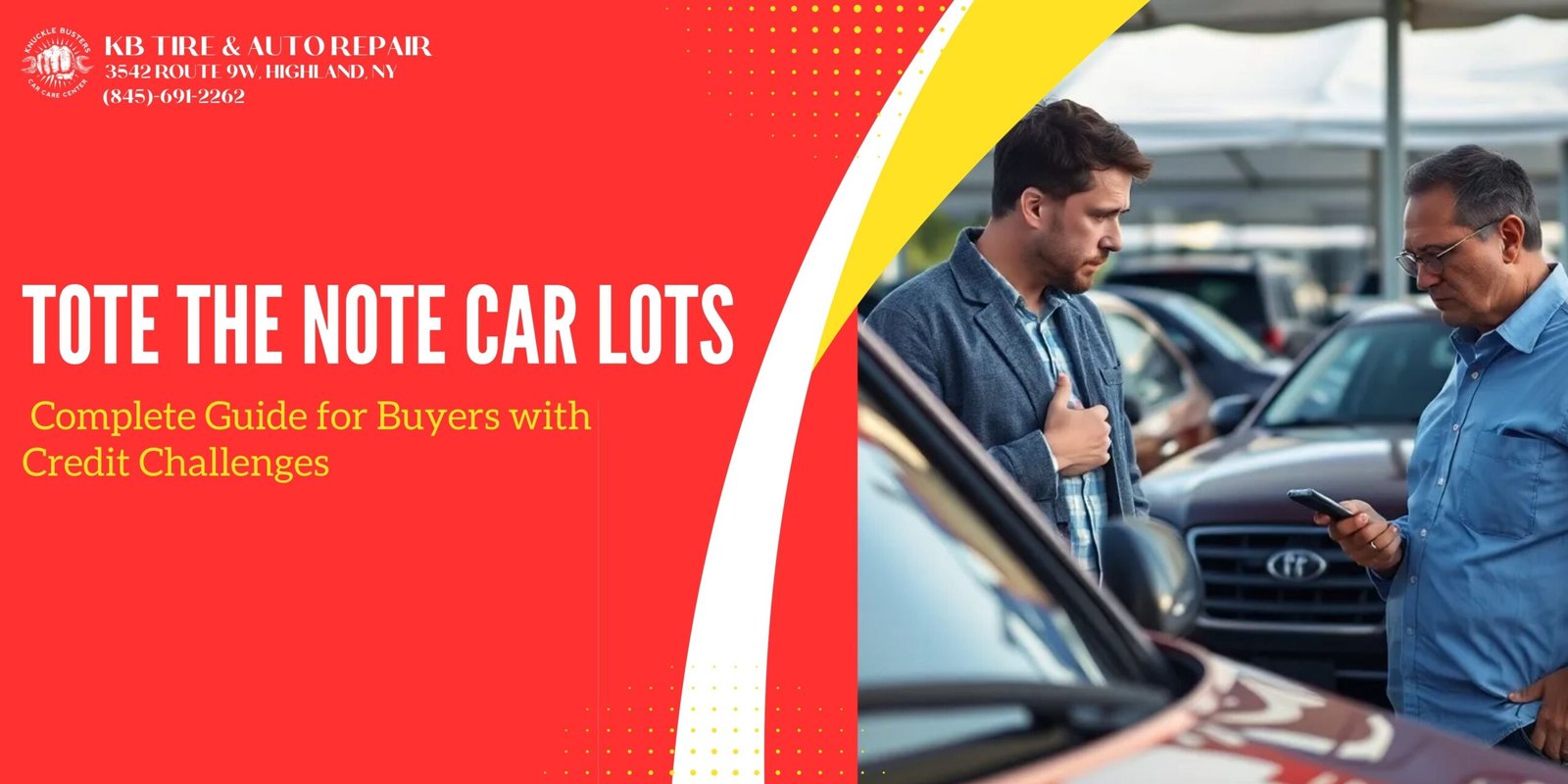Have you been turned down for auto financing due to credit challenges? Don’t worry – “tote the note” car lots might be your answer. These dealerships, also known as “buy here, pay here” lots, offer in-house financing directly through the dealer rather than relying on banks or third-party lenders.
What makes these dealers special is their focus on your current income and ability to pay, not just your credit history. With minimal paperwork requirements, you’ll typically only need proof of income, a bank account, and address verification. This streamlined approach means you can often get approved the same day and drive away in your new vehicle without the usual financing headaches. For many buyers with limited or poor credit histories, tote the note dealers provide a welcome alternative to traditional car-buying experiences.
What Are Tote the Note Car Lots?
Tote the note car lots are dealerships that provide in-house financing directly to car buyers without involving third-party lenders. These dealerships serve as both the seller and the financing source, making vehicle purchases accessible to people with various credit backgrounds.
The History and Evolution of Tote the Note Financing
Tote the note financing emerged as an alternative solution for car buyers facing obstacles with traditional lenders. The term “tote the note” comes from the practice where dealerships would literally hold or “tote” the financial note of the vehicle they sold. This financing model gained popularity during economic downturns when many consumers couldn’t qualify for conventional auto loans. Over time, these dealerships evolved from small independent lots to established businesses with streamlined processes designed specifically for credit-challenged customers.
How Tote the Note Differs from Traditional Auto Financing
Traditional auto financing involves a three-party transaction between you, the dealership, and a separate financial institution like a bank or credit union. In contrast, tote the note car lots simplify this process by handling both the sale and financing under one roof. The key differences include:
- Application Process: Tote the note dealers typically ask only three basic questions: Do you have a job? Do you have a bank account? Can you verify your address? This streamlined approach requires minimal documentation – usually just pay stubs, bank statements, and proof of residence.
- Credit Requirements: Unlike traditional lenders that heavily weigh your credit score and history, tote the note dealers focus primarily on your current ability to make payments. Past financial difficulties aren’t necessarily dealbreakers.
- Payment Structure: Payments are made directly to the dealership, often weekly or bi-weekly rather than monthly, and might require in-person payments at the lot where you purchased the vehicle.
- Approval Speed: Traditional financing can take days for approval, while tote the note lots typically offer same-day decisions and vehicle access.
- Vehicle Selection: These lots generally offer used vehicles rather than new models, with inventory specifically selected to match their financing programs.
Tote the note financing creates opportunities for car ownership when traditional routes are unavailable, particularly for those rebuilding credit or facing temporary financial challenges.
How Tote the Note Car Lots Work

Tote the note car lots operate on a direct financing model where the dealership serves as both the seller and the lender. This streamlined approach eliminates third-party financial institutions, creating a more accessible path to vehicle ownership for those with credit challenges.
The In-House Financing Process
The in-house financing process at tote the note car lots is remarkably straightforward compared to traditional lending methods. After selecting a vehicle, you’ll complete a simple application on-site or sometimes online. Unlike conventional dealerships that send your application to multiple banks, tote the note dealers evaluate your application internally, focusing on your current financial situation rather than past credit history. This evaluation typically takes minutes instead of days, often resulting in same-day approval and allowing you to drive home in your new vehicle that very day.
The approval decision hinges more on your current income and ability to make regular payments than on your credit score. Tote the note dealers care about your present financial stability—whether you have a steady job, a bank account, and a verifiable address—rather than financial mistakes from your past.
Required Documentation and Paperwork
Tote the note car lots require minimal documentation compared to traditional lenders. You’ll typically need to provide:
- A valid driver’s license or state ID
- Recent proof of income (pay stubs, SSI declaration page, or bank statements)
- Proof of current address (utility bills, phone bills, or bank statements)
- Banking information for payment processing
The streamlined paperwork process eliminates many of the barriers that traditional financing creates. You won’t need extensive credit histories, tax returns, or references. This simplified approach allows for quicker processing and provides greater accessibility for buyers who might otherwise struggle to secure financing.
Payment Terms and Collection Methods
Payment terms at tote the note car lots are flexible and customized to fit your financial situation. Financing periods typically range from 12 to 84 months, with payment schedules that accommodate your pay cycle. Unlike traditional auto loans with monthly payments, tote the note dealerships often offer weekly or bi-weekly payment options that align with your income schedule.
Collection methods are typically more hands-on than traditional financing. You’ll make payments directly to the dealership rather than to a third-party lender. Many tote the note car lots offer multiple payment options:
- In-person payments at the dealership
- Online payment portals
- Automatic bank drafts
- Payment by phone
Some dealerships report your payment history to credit bureaus, giving you an opportunity to rebuild your credit with consistent on-time payments. However, this practice varies by dealer, so it’s important to ask whether your payment history will be reported when discussing financing terms.
Benefits of Buying from Tote the Note Dealers

Tote the note car lots offer numerous advantages for buyers who face obstacles with traditional auto financing. These dealerships provide unique solutions tailored to help customers overcome common barriers to vehicle ownership.
Options for Buyers with Poor Credit
Tote the note car lots specialize in helping buyers with credit challenges. These dealerships focus primarily on your current income and ability to make payments rather than your credit history. Unlike traditional lenders that scrutinize your past financial decisions, tote the note dealers care more about your present financial stability. The application process typically requires only basic information: proof of employment, a bank account, and address verification. This accessible financing approach opens doors for buyers with bad credit, no credit, or previous financial difficulties who’d otherwise be turned away by conventional lenders.
Fast Approval Process
The streamlined application process at tote the note dealerships eliminates the lengthy waiting periods associated with traditional auto loans. While conventional financing can take days or even weeks for approval, tote the note car lots often provide same-day decisions. The paperwork requirements are minimal—typically just a bank statement, recent pay stubs, and proof of address. Without third-party lenders involved, the entire transaction becomes more efficient. You can often start your application online, finish the paperwork in person, and drive home in your new vehicle all in the same day.
Building Credit History
Many tote the note dealers report payment histories to major credit bureaus, creating an opportunity to establish or rebuild your credit score through consistent, on-time payments. This credit-building benefit adds substantial value beyond the vehicle purchase itself. For buyers with damaged credit histories, this reporting system offers a path to improved financial standing. Making regular payments on your car loan demonstrates financial responsibility to future lenders and can gradually strengthen your credit profile. Your vehicle purchase becomes both transportation and a stepping stone toward broader financial opportunities.
Potential Drawbacks to Consider

While tote the note car lots provide valuable opportunities for credit-challenged buyers, they come with several limitations worth evaluating before making your purchase decision. Understanding these potential drawbacks helps you approach this financing option with realistic expectations.
Higher Interest Rates and Costs
Tote the note car lots typically charge higher interest rates compared to traditional auto financing. These rates often range from 15% to 30%, significantly exceeding the national average for conventional auto loans. The higher costs reflect the increased risk dealers take by financing buyers with challenged credit histories. Additionally, these dealerships may include various fees not found in traditional financing arrangements, such as processing fees, document fees, and sometimes even payment convenience fees. When comparing vehicles across different dealership types, the total cost of ownership at a buy here, pay here lot can exceed comparable vehicles from traditional sources by 25-40% over the life of the loan.
Vehicle Quality Concerns
Cars available at tote the note dealerships may have quality limitations worth considering. Many vehicles in these lots are older models with higher mileage, typically ranging from 75,000 to 150,000 miles. Pre-purchase inspections are especially important as some tote the note dealers focus more on affordability than vehicle condition. Limited warranty coverage is common, with many dealerships offering minimal protection periods of 30-90 days or warranties covering only specific components. Unlike franchised dealerships with certified pre-owned programs, tote the note lots rarely provide comprehensive vehicle histories or detailed maintenance records for their inventory.
Repossession Risks
Tote the note car lots implement stricter repossession policies than traditional lenders. Many dealerships utilize payment assurance devices (such as GPS trackers or starter interrupters) that can disable your vehicle if payments are missed. Repossession can occur more quickly, sometimes after just one or two missed payments rather than the typical three-payment threshold with traditional lenders. The consequences of repossession from tote the note dealers can be particularly severe, as you’ll lose both your transportation and your entire investment in the vehicle. Missing payments can also result in additional fees, further increasing your financial burden during already challenging circumstances.
Tips for Finding a Reputable Tote the Note Dealer

Finding a trustworthy tote the note car lot requires careful research and evaluation. These dealerships can provide valuable opportunities for those with credit challenges, but selecting the right one makes all the difference in your car-buying experience.
Questions to Ask Before Buying
When visiting tote the note car lots, asking the right questions helps you make informed decisions about your purchase. Start by asking about their financing terms, including the interest rate, loan duration, and payment schedule. Request clarity on down payment requirements and whether they’re flexible with the amount.
Ask if they report payments to credit bureaus, as this can help rebuild your credit score over time. Inquire about their vehicle inspection process and what mechanical checks they perform before selling their cars. Understanding their late payment policies is crucial—ask about grace periods and whether they use GPS tracking or starter interrupt devices.
Find out about their warranty offerings and what’s covered under those warranties. Many reputable dealers provide at least a 30-day warranty on major components. Lastly, ask about their customer satisfaction rate and if they can provide references from satisfied customers.
Red Flags to Watch For
Several warning signs indicate potentially problematic tote the note car lots. Be wary of dealers who pressure you to make quick decisions without providing complete information about the vehicle or financing terms. Excessive fees beyond the standard documentation fees might signal hidden costs that significantly increase your total payment.
Avoid dealerships that don’t allow pre-purchase inspections by independent mechanics. This resistance often indicates they’re hiding mechanical issues. Unclear or verbal-only contracts without proper documentation pose significant risks to your consumer rights and financial security.
Watch out for dealers with consistently negative reviews mentioning predatory practices, vehicle quality issues, or aggressive repossession tactics. Be suspicious if the dealer seems more focused on your down payment than helping you find a suitable vehicle for your needs.
If the dealership has an unusually high inventory turnover due to repossessions rather than sales, this suggests their business model relies on customer failure rather than success. Lastly, dealers who don’t verify your income or ability to pay might be setting you up for failure—responsible lenders ensure you can afford your payments.
Conclusion
Tote the note car lots offer a viable path to vehicle ownership when traditional financing isn’t an option. They prioritize your current situation over past financial mistakes and provide quick approvals with minimal paperwork.
While these dealerships can be your ticket to getting behind the wheel today you should carefully weigh the higher interest rates limited vehicle selection and stricter repossession policies against the convenience they offer.
By doing your homework asking the right questions and watching for red flags you can find a reputable dealer who meets your needs. For many buyers with credit challenges these lots represent not just transportation but an opportunity to rebuild financial standing through consistent payments.
Frequently Asked Questions
What is a “tote the note” car lot?
A “tote the note” car lot, also known as a “buy here, pay here” dealership, provides in-house financing directly to customers. These dealerships serve as both the seller and lender, holding the financial note for vehicles they sell rather than using third-party financial institutions. This model creates more accessible paths to car ownership for those with credit challenges.
Who benefits from tote the note financing?
People with poor credit histories, limited credit, or past financial difficulties benefit most from tote the note financing. These dealerships focus on current income and ability to pay rather than credit scores, making vehicle ownership possible for those who would be rejected by traditional lenders. First-time buyers and those rebuilding credit also find these dealerships accessible.
What documents do I need to buy from a tote the note dealer?
The documentation requirements are minimal compared to traditional financing. You’ll typically need a valid government-issued ID, proof of income (recent pay stubs or bank statements), proof of residence (utility bills or lease agreement), and contact information for personal references. This streamlined approach allows for faster approval and purchase.
How do the payment terms work at tote the note lots?
Payment terms are typically more flexible, with financing periods ranging from 12 to 84 months. Payments are made directly to the dealership on schedules that align with your income cycle—weekly, bi-weekly, or monthly. Most dealers offer multiple payment methods including in-person payments, online portals, and automatic drafts.
Can buying from a tote the note dealer help rebuild my credit?
Yes, many tote the note dealers report payment histories to major credit bureaus. Making consistent, on-time payments can help establish or rebuild your credit score over time. However, this benefit varies by dealership, so it’s important to confirm whether your chosen dealer reports to credit bureaus before purchasing.
Why are interest rates higher at tote the note dealerships?
Interest rates are higher (typically 15-30%) because these dealerships assume greater financial risk by lending to customers with poor or limited credit histories. The rates offset the increased likelihood of payment defaults and repossessions. These higher rates contribute to the overall cost of ownership being 25-40% more than traditional financing options.
What type of vehicles are typically available at tote the note lots?
Tote the note lots usually offer used vehicles, often older models with higher mileage (typically 5-10 years old with 75,000-125,000 miles). The selection may be more limited than at traditional dealerships, focusing on affordable, reliable transportation rather than luxury or newest models. Some dealerships may specialize in certain types of vehicles.
How quickly can I get approved for financing at a tote the note lot?
The approval process is remarkably fast, with many customers receiving same-day approval. Since these dealerships evaluate your current financial situation rather than conducting extensive credit checks, decisions are made quickly—often within 30-60 minutes after submitting basic documentation. This allows buyers to drive away in their new vehicle the same day.
What are the main disadvantages of buying from a tote the note dealer?
The main disadvantages include significantly higher interest rates (15-30%), potential additional fees, older vehicles with higher mileage and limited warranty coverage, and stricter repossession policies. These factors can make the total cost of ownership substantially higher than traditional financing while providing fewer protections for the buyer.
How can I find a reputable tote the note dealer?
Research thoroughly by reading online reviews, checking the Better Business Bureau rating, and asking for recommendations. Visit multiple dealerships to compare inventory quality and pricing. Ask specific questions about financing terms, whether they report payments to credit bureaus, vehicle inspection policies, and warranty offerings. Be wary of pressure tactics and unclear contract terms.
